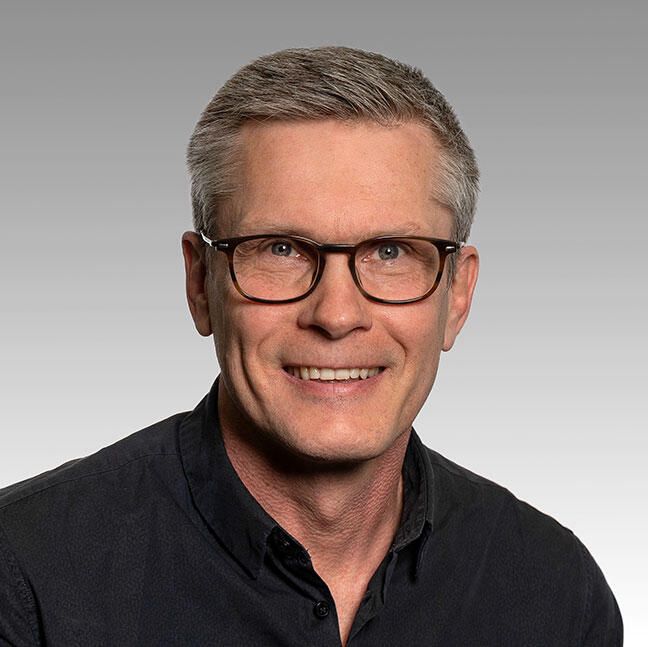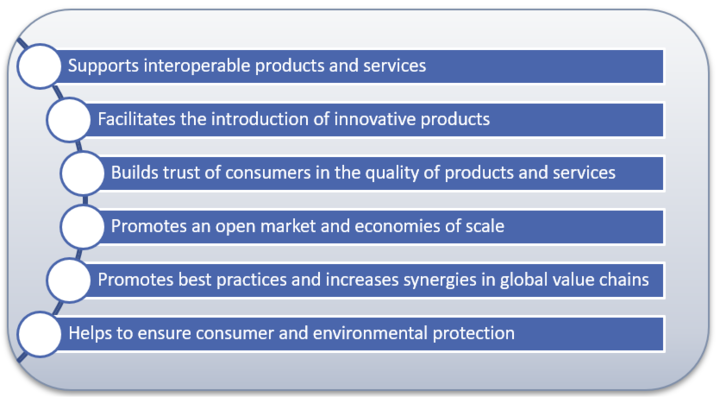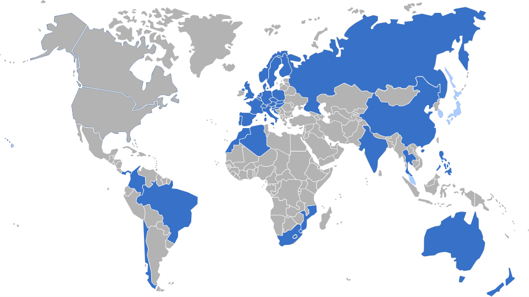Unity instead of isolated solutions
Jesper Engdahl has been shaping the standardisation of electronic toll collection systems in Europe and worldwide for over two decades. As chairman of the European and global working group on electronic fee collection, he is committed to cross-border interoperability and technical harmonisation. In this interview, he talks about challenges, technological developments and the strategic importance of standardisation work.
Jesper Engdahl, you have been chairman of the global and European working group on electronic fee collection since 2004. The mandate administration for the European CEN working group has been confirmed for the years 2025 to 2028! What does that mean for you?
I have been chairman of the Electronic Fee Collection (EFC) Working Group for 21 years. The renewed confirmation in this function is a valuable recognition of our work and the relevance of the EFC standards. The trust placed in me fills me with gratitude and motivates me to take the next steps with care and passion.
And for Rapp, your employer?
A key "unique selling point" for potential consulting contracts is our in-depth expertise. Our strengths lie in analysing relevant data, in identifying trends at an early stage and in our in-depth knowledge of relevant standards, which are often explicitly referred to in invitations to tender. This combination puts us in a good strategic position to act as a competent partner in the development and implementation of standard-based solutions.

| Jesper Engdahl (59) is a graduate electrical engineer (MScEE) and a leading expert in the field of traffic telematics and electronic fee collection. He has worked at Rapp since 2001, where he has been responsible for numerous international projects as a project manager and consultant. These include assignments for the European Commission, the Swiss Federal Customs Administration, the World Bank, Austroads in Australia and various national transport ministries. He is chairman of the global and European standardisation groups for electronic toll systems in ISO and CEN and has played a key role in the development of over 100 standardisation projects. Engdahl speaks five languages, is a partner at Rapp, co-developer of a patent and has over 20 scientific publications to his name. He is regularly active as an expert and moderator at international specialist conferences. In addition to ITS and EFC, his areas of expertise also include digital tachographs and GNSS-based positioning. |
Which standardisation committees are you and your working group involved in?
The "Electronic Fee Collection" working group, one of around 1,600 working groups of the European Committee for Standardisation (CEN), is anchored as Working Group 1 (WG 1) in the CEN/TC 278 "Intelligent Transport Systems" committee. Within the committee, it develops, defines and maintains the technical and functional standards for electronic toll collection systems in Europe with the aim of promoting the interoperability and compatibility of toll systems. The standards also support the policy ("user pays and polluter pays principles") and the legislation of the European Union. Eight EFC standards are also cited and are part of EU legislation relating to the regulated electronic toll service in Europe. In addition, the implementation of the EU Euro Vignette is supported by EFC standards, which define electronic data and data exchange in relation to CO2 emissions from vehicles.
How many countries are united here?
The number of participating countries is currently 34, including Switzerland.
And how is the collaboration structured at the global level?
At the global level, the International Organisation for Standardisation (ISO) is responsible for standardisation in the field of electronic fee collection via the Technical Committee ISO/TC 204 "Intelligent Transport Systems". The corresponding WG 5 working group develops suitable standards worldwide, in particular for interoperability and data interfaces. The focus is on technologies such as DSRC (Dedicated Short Range Communication) and other vehicle communication systems that enable seamless, cross-border collection. It should be noted that close co-operation between ISO and CEN is of central importance. Around 80% of EFC standards are the result of joint work.
Why is this standardisation work so important?
Electronic fee collection offers numerous advantages – including automation, time savings and the option of using digital payment methods.

Der Nutzen der EFC-Standards tabellarisch zusammengestellt
As a user, when do I actually come into contact with electronic fee collection?
Let me start by saying that electronic fee collection (EFC) is a collective term for the use of modern information and communication technologies for the automatic, efficient collection of fees. Including in road traffic as a whole. Motorists are affected when using motorways, tunnels, bridges, car parks or when paying a congestion charge, as is the case in Oslo. This applies to lorry drivers in particular when driving on the motorway.
So is this a huge service for the many motorists and lorry drivers travelling on the roads in Europe and the world?
For motorists and lorry drivers, this makes everyday life noticeably easier, for example when using toll booths. Anyone who remembers the long queues in front of payment stations will know how time-consuming the manual payment process was.
What is the primary goal of the standardisation projects?
Standardisation work creates the basis for a market that is not dominated by isolated solutions, but rather one in which a wide range of providers can coexist. Our goal is to set technical standards that enable interoperable, harmonised electronic fee collection worldwide. Modern systems work across borders so that users can pay charges in different regions or countries with one contract and one vehicle device. The collection is automated and takes place in the free flow of traffic, eliminating the need for manual payment processes or stops.
The EFC standards are a success story and form the basis for the interoperability of toll collection systems. They are used in more than 40 countries. More than 200 million compliant vehicle devices are in use in 150 systems worldwide.

Blau markiert die Länder mit EFC-Standards
What exactly does your work or that of the working group involve?
Roughly summarised, the work of WG1 includes the development of technical specifications for communication between vehicles and infrastructure as well as back-office systems. This all takes place in the context of charging, the harmonisation of protocols and standards for payment processing and data transfer, and the promotion of interoperability between national and regional systems. The working group forms a unique interface where both technical and operational aspects of electronic fee collection are brought together at the European and international level.
What's on the agenda for the next few years?
We are currently working hard to provide three standards to support the regulated electronic toll service as a result of a formal request from the European Commission. These standards should be included in a future update of EU legislation. In the next few years, standardisation work will focus on several parallel priorities – around ten initiatives will be pursued simultaneously on an ongoing basis. Existing specifications will continue to be updated and further developed.
Is there a central focus here?
A central focus is on the revision of the EN 16986 profile standard, which regulates the exchange of information between toll service providers (TSPs) and toll collection centres (TCs). The aim is to create a robust technical basis for the interoperability of different tolling technologies and principles. Another focus is on ensuring the long-term suitability of DSRC tolling technology. At the same time, the use of image-based tolling systems (e.g. ANPR) is being refined.
Are there any topics that go beyond this?
In addition, toll systems are also emerging as a potential replacement for fuel taxation on electric vehicles – particularly through the use of road usage data from networked vehicles. Other topics include integration with related areas of intelligent transport systems, such as joint payment systems and traffic management.
How do you keep track of all these different topics?
I try to actively memorise the most important points, keep priorities in mind and specifically delegate goals to subgroups. It is important to me to tackle issues proactively.
What is your role on this committee?
As chairman of a working group (convenor) at CEN and ISO, I am responsible for managing the activities of the working group. I ensure that the planned tasks are realised on schedule in accordance with the specifications of the superordinate Technical Committee (TC). I am responsible for the organisation and overall management of the work and for chairing the meetings. The most important tasks include striving for broadly harmonised solutions and reaching a consensus. Reporting to higher-level bodies is another important part of the role.
Those are probably not the only tasks?
Actually, they are not. I inform the members about applicable rules and procedures, submit at least one interim draft to the Technical Committee Secretariat, ensure the quality of the standards and assess the consensus status of the drafts before they are forwarded. If required, I take part in editing committees. The appointment as Convenor is made by the Technical Committee on the proposal of the national standardisation organisations for a term of up to three years, with the possibility of extension.
Does the job involve a lot of travelling?
Less than before. Since the Corona pandemic, our meetings have been held both online and in hybrid form. The organisation and involvement of the participants are challenging, especially as the meetings usually rotate throughout Europe. The next meeting will take place in Tokyo, followed by another in Strasbourg. Four WG plenary sessions and around 80 online editorial meetings are held each year, with around 35 participants from 13 countries. In addition, the higher-level TC committees on the CEN and ISO level meet twice a year, with around 25 and 100 experts respectively taking part in each meeting.
|
CEN (European Committee for Standardisation) is an organisation recognised by the EU and EFTA for the development of European standards (ESs). These standards define specifications and procedures for materials, processes, products and services with the goal of promoting safety, quality and cross-border trade in the European single market. CEN consists of the national standardisation institutes of 34 European countries. The standards are developed by consensus with experts from business, research, consumer and environmental organisations. CEN is also working on the international harmonisation of standards through an agreement with ISO. Further information: EU communications and information protocols (EU-ICIP) guide to ITS standards |